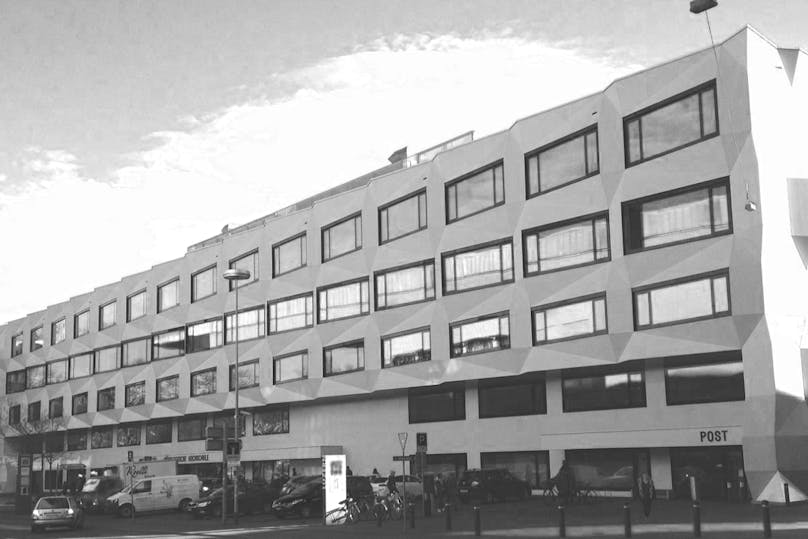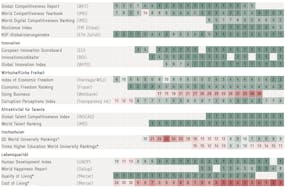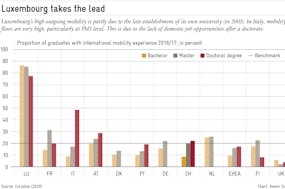Globalisation’s critics are legion. But one welcome outcome has been the greater transparency that has arisen in higher education and the improved incentives for top universities to compete in international league tables of academic excellence.
Switzerland has fared well. Its two federally funded Institutes of Technology in Zurich and Lausanne rate regularly among the world’s best. Zurich’s and Geneva’s cantonally financed universities also often make the “top 100” lists. Elsewhere in Switzerland, tertiary education has flourished, with new universities like in Lugano and even faster expansion among the regionally sponsored and technically orientated institutes of higher education.
But Switzerland’s status has come at a price: public spending on research and teaching has soared by 70% since 2000 – far higher than overall expenditure or GDP. It now accounts for about one fifth of total public spending, and represents the highest expenditure per head of any country in the world.
The munificence reflects in part increasing global competition among elite universities and the critical mass required to attract and conduct top level research. But it also betrays wastefulness and duplication as every region or canton jockeys to get into the higher education act.
Whether such generosity can be sustained is moot. With an ever ageing population and pressure on public sector budgets, rising financial burdens for health and social services alone will make it impossible for even the wealthy Swiss to continue showering tertiary education with money. Ensuring scare resources are invested wisely will become ever more important.
Sadly, the signs are that politisation and regionalism (arguably inevitable given Switzerland‘s highly federal political system and its direct democracy) have prompted duplication, excessive costs and a potential threat to standards. Only thorough reform can eliminate such temptations.
A new Avenir Suisse study calls for taking politics out of high education by reducing politicians’ influence on decision making and giving universities greater strategic and operational flexibility.
The report acknowledges the obvious attractions of spending on higher education: teaching and research can foster innovation and help to develop the highly trained workforce that is particularly valuable to a small, export orientated economy like Switzerland’s. High standards are likely to grow in importance as safeguards for national prosperity as nations compete ever more fiercely in high tech and try to combat the looming skills shortages prompted by declining birth rates.

The University of Lucerne, established in 2000, is Switzerland’s smallest and youngest university. (Wikimedia Commons)
So while the report acknowledges the obvious political appeal of expanding higher education – not least for fringe regions seeking prestige – it highlights the dangers of duplication and dumbing down. That applies particularly to technical institutes of higher education that have grown fastest in recent years. Even universities have shown worrying signs of duplication: take the similarities between the courses offered at Zurich and Luzern, barely an hour apart. With a population of just 8.2m, Switzerland now boasts no less than 38 institutes of higher education, spread over 80 separate locations.
The Swiss are far from alone in grappling with issues like how universities should be funded, what proportion of school leavers should be admitted, or what role the private sector should play.
The Swiss have, traditionally, had a relatively restrictive entrance system, with barely 20 per cent of school leavers studying at university, but have imposed scant limits on those making the cut. Tuition fees are remarkably low by international standards, and any school leaver passing the baccalauréat can study virtually whatever or wherever they want (apart from medicine, where numbers are restricted) The introduction of the Bologna system of bachelor’s and master’s degrees has led to some improvements, but dropout rates remain high.
Avenir Suisse’s authors Matthias Ammann, Patrik Schellenbauer and Peter Grünenfelder say tuition fees should be raised to increase students’ awareness of the value of a degree, and much greater emphasis should be placed on student selection and suitability for specific courses. They also recommend greater transparency in university teaching, including regular graduate surveys and better benchmarking, alongside giving universities more freedom to access private funding, subject to strict and transparent conflict of interest rules. Only through such reforms, the authors argue, will it be possible for Switzerland to preserve its enviable university peaks.
Excellence, not Regional Politics, at Swiss universities – A 10 point plan for competitive higher education, by Matthias Ammann, Patrik Schellenbauer and Peter Grünenfelder.





